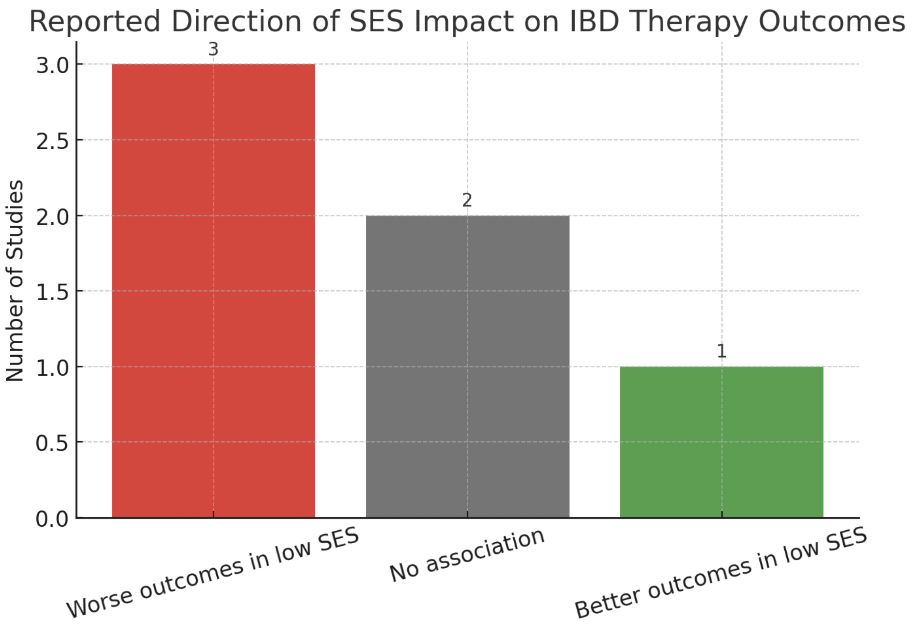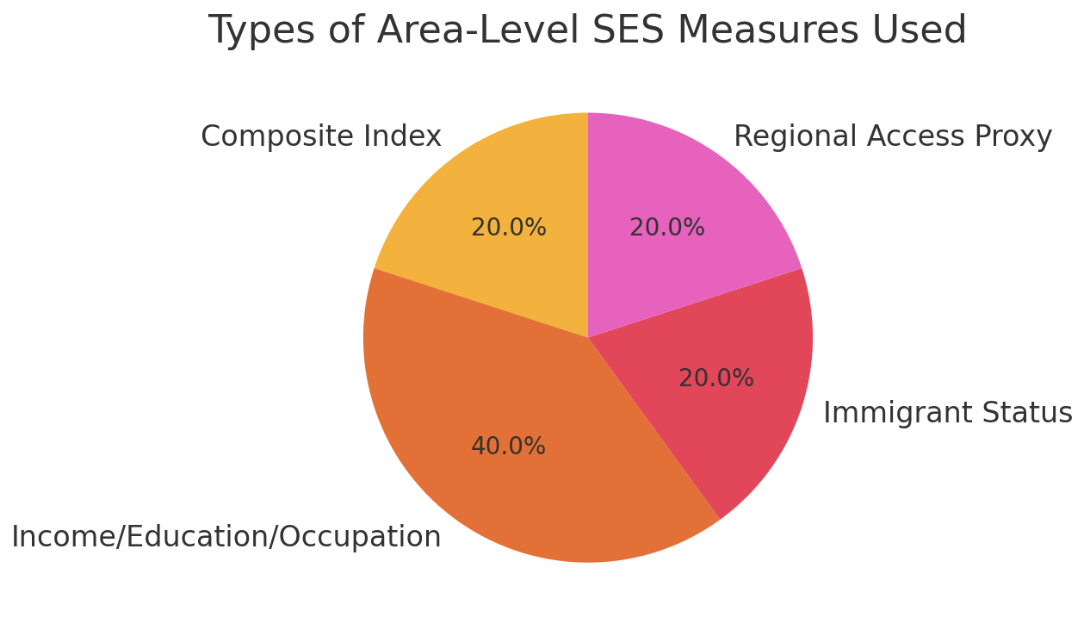Sunday Poster Session
Category: IBD
P1059 - Disparities in Advanced IBD Therapy: A Systematic Review of Area-Based Socioeconomic Influence
Sunday, October 26, 2025
3:30 PM - 7:00 PM PDT
Location: Exhibit Hall

Ibrahim Mohammed, MD (he/him/his)
Albany Medical Center
Waterbury, CT
Presenting Author(s)
Ibrahim Mohammed, MD1, Yehya Maitah, 1, Mohammed Mohammed, 2, Ahmed K. Nada, 3, Shamayel Safdar, MBBS1, Osama Alshakhatreh, MD1, Zarbakht Nisar, MBBS1, Cade Kelleher, MD1, Shunsa Tarar, DO1, Kumael Jafri, BS1, Jad Moumen, MD1, Mohsin Chundrigar, MBBS1, Augustine Amponsah, MD1, Tarick Ahmad, BS1, Aryan Jain, MBA1, Seth Richter, MD, FACG1
1Albany Medical Center, Albany, NY; 2Ain Shams University, Cairo, Al Qahirah, Egypt; 3Ain Shams University, Nasir City, Al Qahirah, Egypt
Introduction: Patients with inflammatory bowel disease who live in peripheral or lower socioeconomic areas are less likely to obtain biologic therapy and have worse clinical results than those who live in more central or affluent areas, according to several population-based studies. Significant discrepancies still exist, especially in areas with lower socioeconomic status or less healthcare resources. This study aimed to review the association between area-level socioeconomic status and access to or response to advanced therapies in patients with inflammatory bowel disease.
Methods: In May 2025, we systematically searched PubMed, Embase, Web of Science, and the Cochrane Library using broad terms to identify studies evaluating area-level socioeconomic status (SES) and its association with inflammatory bowel disease (IBD) outcomes. Eligible studies included those that reported geographically linked SES measures—such as income, education, occupation, immigrant status, or regional healthcare access—and assessed outcomes related to biologic or small molecule therapies. Two reviewers independently screened and extracted data. Outcomes of interest included treatment initiation, adherence, and healthcare access.
Results: We screened 22,677 studies and included 5 that met criteria. Study designs included 4 cohort studies and 1 cross-sectional study, conducted in Denmark, France, Spain, Germany, and Canada. Area-level socioeconomic status (SES) was assessed through various methods, including national deprivation indices, census-linked income and education data, regional access measures, and immigrant status. Three studies reported worse outcomes in lower SES groups, including delayed treatment initiation, long-term nonuse of medications, and limited access to specialists. One study showed better biologic use among immigrants, while one found no association between SES and biologic access. Definitions of SES and outcome measures were heterogeneous across studies.
Discussion: Lower area-level SES—based on income, immigrant status, or regional deprivation—was frequently associated with delayed treatment or reduced biologic use in IBD. While findings were inconsistent, disparities in access suggest a need for targeted policy and system-level interventions.

Figure: Figure 1. Reported Direction of SES Impact on IBD Therapy Outcomes.
Among the five included studies, most reported worse outcomes associated with lower socioeconomic status (SES), while others found no association or noted better outcomes in specific low-SES subgroups (e.g., immigrants).

Figure: Figure2. Types of Area-Level SES Measures Used.
Studies used a range of geographic SES indicators, including census-linked income and education data, composite deprivation indices, immigrant status, and proxies for healthcare access based on regional characteristics.
Disclosures:
Ibrahim Mohammed indicated no relevant financial relationships.
Yehya Maitah indicated no relevant financial relationships.
Mohammed Mohammed indicated no relevant financial relationships.
Ahmed Nada indicated no relevant financial relationships.
Shamayel Safdar indicated no relevant financial relationships.
Osama Alshakhatreh indicated no relevant financial relationships.
Zarbakht Nisar indicated no relevant financial relationships.
Cade Kelleher indicated no relevant financial relationships.
Shunsa Tarar indicated no relevant financial relationships.
Kumael Jafri indicated no relevant financial relationships.
Jad Moumen indicated no relevant financial relationships.
Mohsin Chundrigar indicated no relevant financial relationships.
Augustine Amponsah indicated no relevant financial relationships.
Tarick Ahmad indicated no relevant financial relationships.
Aryan Jain indicated no relevant financial relationships.
Seth Richter indicated no relevant financial relationships.
Ibrahim Mohammed, MD1, Yehya Maitah, 1, Mohammed Mohammed, 2, Ahmed K. Nada, 3, Shamayel Safdar, MBBS1, Osama Alshakhatreh, MD1, Zarbakht Nisar, MBBS1, Cade Kelleher, MD1, Shunsa Tarar, DO1, Kumael Jafri, BS1, Jad Moumen, MD1, Mohsin Chundrigar, MBBS1, Augustine Amponsah, MD1, Tarick Ahmad, BS1, Aryan Jain, MBA1, Seth Richter, MD, FACG1. P1059 - Disparities in Advanced IBD Therapy: A Systematic Review of Area-Based Socioeconomic Influence, ACG 2025 Annual Scientific Meeting Abstracts. Phoenix, AZ: American College of Gastroenterology.
1Albany Medical Center, Albany, NY; 2Ain Shams University, Cairo, Al Qahirah, Egypt; 3Ain Shams University, Nasir City, Al Qahirah, Egypt
Introduction: Patients with inflammatory bowel disease who live in peripheral or lower socioeconomic areas are less likely to obtain biologic therapy and have worse clinical results than those who live in more central or affluent areas, according to several population-based studies. Significant discrepancies still exist, especially in areas with lower socioeconomic status or less healthcare resources. This study aimed to review the association between area-level socioeconomic status and access to or response to advanced therapies in patients with inflammatory bowel disease.
Methods: In May 2025, we systematically searched PubMed, Embase, Web of Science, and the Cochrane Library using broad terms to identify studies evaluating area-level socioeconomic status (SES) and its association with inflammatory bowel disease (IBD) outcomes. Eligible studies included those that reported geographically linked SES measures—such as income, education, occupation, immigrant status, or regional healthcare access—and assessed outcomes related to biologic or small molecule therapies. Two reviewers independently screened and extracted data. Outcomes of interest included treatment initiation, adherence, and healthcare access.
Results: We screened 22,677 studies and included 5 that met criteria. Study designs included 4 cohort studies and 1 cross-sectional study, conducted in Denmark, France, Spain, Germany, and Canada. Area-level socioeconomic status (SES) was assessed through various methods, including national deprivation indices, census-linked income and education data, regional access measures, and immigrant status. Three studies reported worse outcomes in lower SES groups, including delayed treatment initiation, long-term nonuse of medications, and limited access to specialists. One study showed better biologic use among immigrants, while one found no association between SES and biologic access. Definitions of SES and outcome measures were heterogeneous across studies.
Discussion: Lower area-level SES—based on income, immigrant status, or regional deprivation—was frequently associated with delayed treatment or reduced biologic use in IBD. While findings were inconsistent, disparities in access suggest a need for targeted policy and system-level interventions.

Figure: Figure 1. Reported Direction of SES Impact on IBD Therapy Outcomes.
Among the five included studies, most reported worse outcomes associated with lower socioeconomic status (SES), while others found no association or noted better outcomes in specific low-SES subgroups (e.g., immigrants).

Figure: Figure2. Types of Area-Level SES Measures Used.
Studies used a range of geographic SES indicators, including census-linked income and education data, composite deprivation indices, immigrant status, and proxies for healthcare access based on regional characteristics.
Disclosures:
Ibrahim Mohammed indicated no relevant financial relationships.
Yehya Maitah indicated no relevant financial relationships.
Mohammed Mohammed indicated no relevant financial relationships.
Ahmed Nada indicated no relevant financial relationships.
Shamayel Safdar indicated no relevant financial relationships.
Osama Alshakhatreh indicated no relevant financial relationships.
Zarbakht Nisar indicated no relevant financial relationships.
Cade Kelleher indicated no relevant financial relationships.
Shunsa Tarar indicated no relevant financial relationships.
Kumael Jafri indicated no relevant financial relationships.
Jad Moumen indicated no relevant financial relationships.
Mohsin Chundrigar indicated no relevant financial relationships.
Augustine Amponsah indicated no relevant financial relationships.
Tarick Ahmad indicated no relevant financial relationships.
Aryan Jain indicated no relevant financial relationships.
Seth Richter indicated no relevant financial relationships.
Ibrahim Mohammed, MD1, Yehya Maitah, 1, Mohammed Mohammed, 2, Ahmed K. Nada, 3, Shamayel Safdar, MBBS1, Osama Alshakhatreh, MD1, Zarbakht Nisar, MBBS1, Cade Kelleher, MD1, Shunsa Tarar, DO1, Kumael Jafri, BS1, Jad Moumen, MD1, Mohsin Chundrigar, MBBS1, Augustine Amponsah, MD1, Tarick Ahmad, BS1, Aryan Jain, MBA1, Seth Richter, MD, FACG1. P1059 - Disparities in Advanced IBD Therapy: A Systematic Review of Area-Based Socioeconomic Influence, ACG 2025 Annual Scientific Meeting Abstracts. Phoenix, AZ: American College of Gastroenterology.
